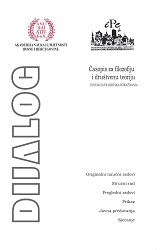Sticanje suverenog i nezavisnog državno-pravnog statusa Bosne i Hercegovine predstavlja istorijski preokret na kraju dvadesetog stoljeća
The acquirement of Sovereign and Independent state-legal status of Bosnia and Herzegovina represents a historical turning point at the end of the 20th century
Author(s): Mirko PejanovićSubject(s): Political history, Government/Political systems, International relations/trade, Transformation Period (1990 - 2010), Geopolitics, Peace and Conflict Studies
Published by: Akademija Nauka i Umjetnosti Bosne i Hercegovine
Keywords: Socialist Federal Republic of Yugoslavia; Republic of Bosnia and Herzegovina; Assembly of Bosnia and Herzegovina; Citizens’ referendum; Badinter Commission; European Union; United Nations;
Summary/Abstract: Geopolitical changes in Europe and the world led to the deepening of the crisis in the survival and functioning of the Socialist Federation of Yugoslavia (SFRJ) at the end of the 1980s. Due to the conflicting conceptions of the Yugoslav republics about finding a peaceful solution to the crisis of the Yugoslav Federation, mistrust prevailed between the forces of the Greater Serbian state hegemony with the project of all Serbs in one state, and the democratic forces in the four Yugoslav republics: Croatia, Slovenia, Macedonia and Bosnia and Herzegovina, which advocated their sovereignty and independence at the end of the dissolution process of the SFRY. After multi-party elections, Slovenia, Croatia and Macedonia held citizens’ referendums and declared their sovereignty and independence. Bosnia and Herzegovina as a multi-ethnic, actually multi-national Yugoslav republic faced the historical challenge of continuing the historical development of its established statehood, decisions of the First Session of ZAVNOBiH in 1943 in the form of a sovereign and independent state-legal status or to be a part of Milošević’s Great Serbia. It is about the fact that the proclaimed Federal Republic of Yugoslavia was only a form for the essence, which related to the realization of the project that all Serbs live in one state. During 1991, in the multi-party Parliament of Bosnia and Herzegovina, a proposal was formulated by five opposition and two ruling parties that the citizens should decide on the political future of the Republic of Bosnia and Herzegovina through a republican referendum. The conditions for conducting the referendum were determined by the Badinter Commission, whose position simultaneously indicated the support of the European Union for Bosnia and Herzegovina to acquire a sovereign and independent state-legal status through a citizens’ referendum. The citizens, with their democratic will expressed in the referendum held on February 24th and March 1st, 1992, provided the political basis for the international recognition of Bosnia and Herzegovina. International recognition was first made by the countries of the European Union on April 6th, 1992. During 1992, 76 countries of the world passed decisions on the international recognition of Bosnia and Herzegovina. The very act of admission of Bosnia and Herzegovina to the United Nations took place on May 22nd, 1992. Since that time, Bosnia and Herzegovina has existed as a sovereign and independent state in the international order with its historical and international borders.
Journal: Dijalog - Časopis za filozofiju i društvenu teoriju
- Issue Year: 2022
- Issue No: 01+02
- Page Range: 9-23
- Page Count: 15
- Language: Bosnian

